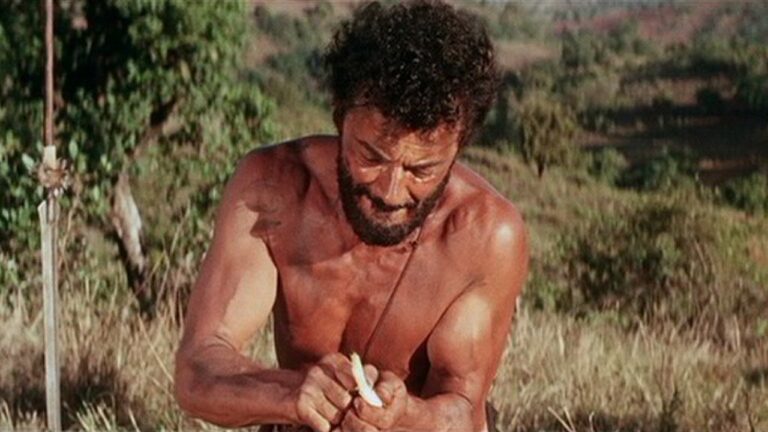We love a good remake—when done right, it breathes new life into a classic story. But sometimes the source material gets buried under the fame of the newer version. Here’s a look at popular films that borrowed heavily from lesser-known predecessors, how they compare, and why the originals deserve a spot on your watchlist.
1. Apocalypto (2006) vs. The Naked Prey (1965)
The Connection:
Mel Gibson’s Apocalypto wowed audiences with its gritty realism and intense survival narrative, following a man fleeing capture through the dense Mesoamerican jungle. But its spiritual predecessor, The Naked Prey, directed by and starring Cornel Wilde, told a strikingly similar story decades earlier: a white hunter in colonial Africa is stripped and hunted by a native tribe after a colonial offense.
Comparison:
While Apocalypto is drenched in cinematic polish and historical grandeur, The Naked Prey is minimalist, raw, and surprisingly ahead of its time. It uses little dialogue and leans heavily on physical performance and suspense. Both films center on the primal fight for survival, but Wilde’s version is more meditative, stripped to its essential human struggle.
Why Watch the Original?
It’s a landmark in minimalist survival storytelling. Wilde’s decision to portray indigenous characters with dignity (especially for 1965) and the film’s haunting atmosphere make it more than just a historical curiosity—it’s artful, intense, and still relevant.
2. The Departed (2006) vs. Infernal Affairs (2002)
The Connection:
Martin Scorsese’s Oscar-winning crime thriller is a direct remake of the Hong Kong film Infernal Affairs. Both follow the cat-and-mouse game between an undercover cop and a mole inside the police department.
Comparison:
The Departed stretches the story into a sprawling Boston drama with big names and even bigger twists, while Infernal Affairs is slicker and tighter, focusing more on suspense and moral ambiguity.
Why Watch the Original?
It’s leaner, sharper, and arguably more suspenseful. Plus, it helped kickstart a renaissance in Asian cinema appreciation in the early 2000s. If you liked The Departed, Infernal Affairs will feel like a distilled shot of noir.
3. The Magnificent Seven (1960) vs. Seven Samurai (1954)
The Connection:
The American Western classic is a remake of Akira Kurosawa’s Seven Samurai, widely regarded as one of the greatest films ever made.
Comparison:
Both follow a group of warriors defending a helpless village, but Seven Samurai is more layered, emotionally complex, and visually groundbreaking. The Magnificent Seven makes the tale more palatable for a Western audience but trims much of the philosophical depth.
Why Watch the Original?
Kurosawa’s work is a masterclass in storytelling, pacing, and character development. It’s long, yes, but it builds a world and ethos that stay with you.
4. Vanilla Sky (2001) vs. Open Your Eyes (Abre los ojos) (1997)
The Connection:
Cameron Crowe’s Vanilla Sky, starring Tom Cruise, is a remake of the Spanish film Abre los ojos, directed by Alejandro Amenábar.
Comparison:
Vanilla Sky is slicker, louder, and more visually experimental, while Abre los ojos is more grounded, psychological, and unsettling. Penélope Cruz plays the same role in both films—making this a particularly fascinating comparison.
Why Watch the Original?
Abre los ojos builds its mystery more organically. It’s less concerned with explaining everything and more interested in evoking existential dread. If you like your sci-fi with a dose of quiet paranoia, it’s a must-see.
5. Let Me In (2010) vs. Let the Right One In (2008)
The Connection:
The American remake of the Swedish horror-romance kept much of the plot and tone of Let the Right One In, but with an English-language cast and a few cultural tweaks.
Comparison:
Both are haunting and intimate tales of childhood, isolation, and vampirism, but the Swedish original is colder, lonelier, and more ambiguous, giving it a chilling edge.
Why Watch the Original?
Its icy aesthetic, deliberate pacing, and delicate performances make it a unique experience in horror cinema. It’s less about blood and more about quiet, creeping terror—and it sticks with you.
Final Thoughts: Why Originals Matter
Remakes aren’t inherently bad—many are love letters to their source material. But watching the originals lets you see the pure vision that inspired the update. Often bolder, more experimental, or culturally specific, they offer a different lens—and sometimes a more profound experience.
So next time you’re browsing for something to watch, skip the remake and go straight to the source. You might discover a gem that never got its due.



Comments are closed.